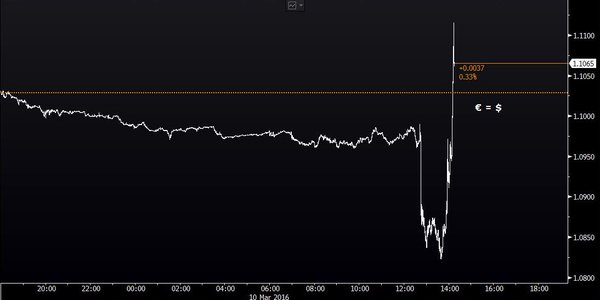I’ll try and keep this gracefully short: Mario Draghi ‘unleashed’ a bazooka full of desperate tools on the financial markets yesterday and they blew up in his face faster than you could say blowback or backdraft (and that’s just the start of the alphabet). This must and will mean that Draghi’s stint as ECB head is for all intents and purposes done. But…
But there are two questions: 1) who has the power to fire him (not an easy one), and 2) who can replace him. Difficult issues because the only candidates that would even be considered for the job by the same people who hired -no, not elected- Mario -and who will still be in power after he’s gone-, under present conditions, are carbon copies of Draghi. They all went to the same schools, worked for the same banks etc.
So maybe they’ll let him sit a bit longer. Then again, the damage has been done, and Mario has done a lot of destruction, is what the markets said yesterday. But to replace him with someone who’s also already lost all credibility, because they supported Mario every step of the way, carries a very evident risk: that nobody will believe in the entire ECB itself anymore. If you ask me, it’s crazy that anyone still would, but that’s another chapter altogether.
Not that Janet Yellen and Japan’s Kuroda and China’s Zhou Xiaochuan should not also be put out by the curb. While they may -seem to- vary in approaches today, they all started from the same untested, purely theoretical and entirely clueless origins. Just saying. None of them have any idea what negative rates etc will lead to. They’re all in the same rabbit hole. And that’s not a joke, it’s deeply sad.
Ultra-low interest -even negative- rates and bond purchases to the tune of $1 trillion a year, Mario’s schtick, exist all across the formerly rich world. And they all do for the same purpose: to make the people think that they, and their economies, are still rich. Just so bankers can take from them whatever it is they still do have. Think pension funds, investment funds.
Why did this pandemonium of ZIPR and QE ever get started? Because central banks, and the economists that work within them, edged along by bankers who risked behemoth losses, said the most important thing to do was to ‘save’ the banking system, and they can always find some theory to confirm that preference.
But the banking system is where the losses are, and it’s where the risks are. Which are then both transferred to Joe and Jane Blow, who subsequently have less to spend, which defeats the alleged central bank purpose of ‘stimulating’ the economy.
Draghi’s argument for the new (water-)bazooka measures is that without them, Europe would face ‘awful’ deflation. But it’s his very measures that create and encourage deflation. So who still knows how to count beyond 101? Good question.
But anyway, I just wanted to say that Draghi’s gone in all but physical presence. And if they keep him on for a while longer, that means that what happened today will happen again, just faster. Big risk.
No Super Mario no more.
What happened with Draghi yesterday is eerily reminiscent of the ‘glorious’ Bernanke days, when ‘poor’ Ben would make one of his weighty announcements and the effects he was looking for would fizzle out within hours. In full accordance with the law of diminishing returns, Draghi’s new and far more desperate measures lost their very meaning even within the space of barely more than half an hour. This EURUSD graph says it all:

Europe’s best hope, somewhat ironically, is German resistance against Draghi, which yesterday reached a point of no return. Ambrose Evans-Pritchard gave a perfect example overnight of why that is:
Professor Richard Werner from Southampton University, the man who invented the term QE, said the ECB’s policies are likely to destroy half of Germany’s 1,500 savings and cooperative banks over the next five years. They cannot pass on the negative rates to savers so their own margins are suffering. “They are under enormous pressure from regulatory burdens already, and now they are reaching a tipping point,” he said.
These banks make up 70pc of German deposits and provide 90pc of loans to small and medium firms, the Mittelstand companies that form the backbone of German industry. Prof Werner said these lenders are being punished in favour of banks that make their money from asset bubbles and speculation.
“We have learned nothing from the financial crisis. The sooner there is a revolt in Germany, the better,” he said.
Draghi’s done. This hole is too deep for him to climb out of.


